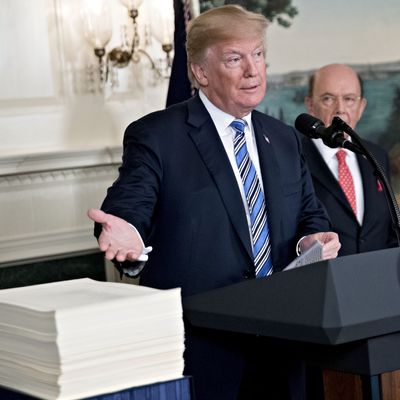
On Friday, Donald Trump began lobbing verbal attacks against the budget bill his administration had already promised to sign. After wavering on whether he would go through with that promise, Trump called the bill a “ridiculous situation” and proclaimed, “I will never sign another bill like this again.” It had all the hallmarks of another Mad King episode. “The details of this spending package should not have been new to the president … So members were perplexed when Trump, all of a sudden, seemed to not know what was in the bill Friday and said he might not sign it,” a Washington Post report delicately put it. Politico put the matter less delicately: “The press and comms team, more than others, are at their wits’ end.” And retiring Republican representative Charlie Dent put it less delicately still: “The spontaneity and lack of impulse control are areas of concern for lots of members on both sides of the aisle.”
In this instance, though, there is a method to the madness — or, at least, a pattern. It is a hallowed ritual for Republican presidents to loudly decry the ridiculous and terrible spending levels that congressional Democrats have forced upon them.
Conservative doctrine holds that taxes should be cut everywhere and always. This is one of the ways that the Republican Party differs from right-of-center parties in other countries. Republicans simply don’t believe that they need to account for spending levels when they set revenue levels. The policy is to cut taxes, insist that lower taxes will not produce unacceptably high deficits, and then, when the deficits inevitably occur, blame spending.
Republicans in Congress and the conservative media have enthusiastically decried the budget and blamed it for unacceptable deficits, without acknowledging that they all supported massive tax cuts and had no plan to reduce spending in response. Right-wing commentator John Stossel recirculated a Ronald Reagan quote that has long encapsulated the party’s fiscal doctrine:
Stossel seems to have intended the quote as a restatement of what conservatives consider an eternal truth Reagan left behind to the world. What it actually demonstrates is just how long the party has been engaging in this absurd blame-shifting exercise. Reagan started proclaiming that spending, not taxes, was the cause of the high deficit when he took office. The deficit exploded as a result of Reagan’s own combination of tax cutting and increased military spending. But even at the end, Reagan was denying that his policy of higher defense spending and lower revenue had any relationship to the larger gap between spending and revenue. “Deficits, as I’ve often said, aren’t caused by too little taxing; they are caused by too much spending,” he wrote in his memoir. “Presidents don’t create deficits; Congress does.”
George W. Bush followed the same pattern. After enacting massive tax cuts and increases in security spending, and promising it would not cause deficits, Bush repeatedly blamed Congress for the deficit. (“What we need is spending discipline in Washington, D.C.”)
Of course, Reagan and Bush signed the spending bills that they were decrying. If they truly wanted to reduce spending to a level in accord with revenue, they could have threatened to veto any spending bill about the desired level. Alternatively, they could have arranged to cut spending before cutting taxes. But neither of them ever did either of these things. The trade-offs necessary to cut domestic spending enough to eliminate or even reduce the deficit would be far too unpopular. Republicans understand full well that the public would oppose the tax cuts and defense increases if they had to reduce domestic spending to offset their cost.
A sane party facing this dilemma would scale back its policy goals. Lower tax rates failed either to produce enough growth to offset the revenue loss, or to force Congress to cut spending, so why not try to set revenue at a level appropriate for the actual spending levels you’re going to have?
That very notion is such an affront to conservatism it is virtually never discussed within conservative circles. As Rick Perlstein memorably put it, conservatism never fails, it is only failed. And so it becomes regularly necessary for conservatives to explain away the failure of their tax cuts by trumpeting the Democrats and their big-spending ways as the true culprits. Republican presidents must not only admit that the spending bills they negotiated are bad, they must trumpet this fact as loudly as possible. As bizarre as it may seem for a president to deliberately call attention to policy failures he helped carry out, it is the necessary result of a policy dogma incapable of grappling with reality.






























